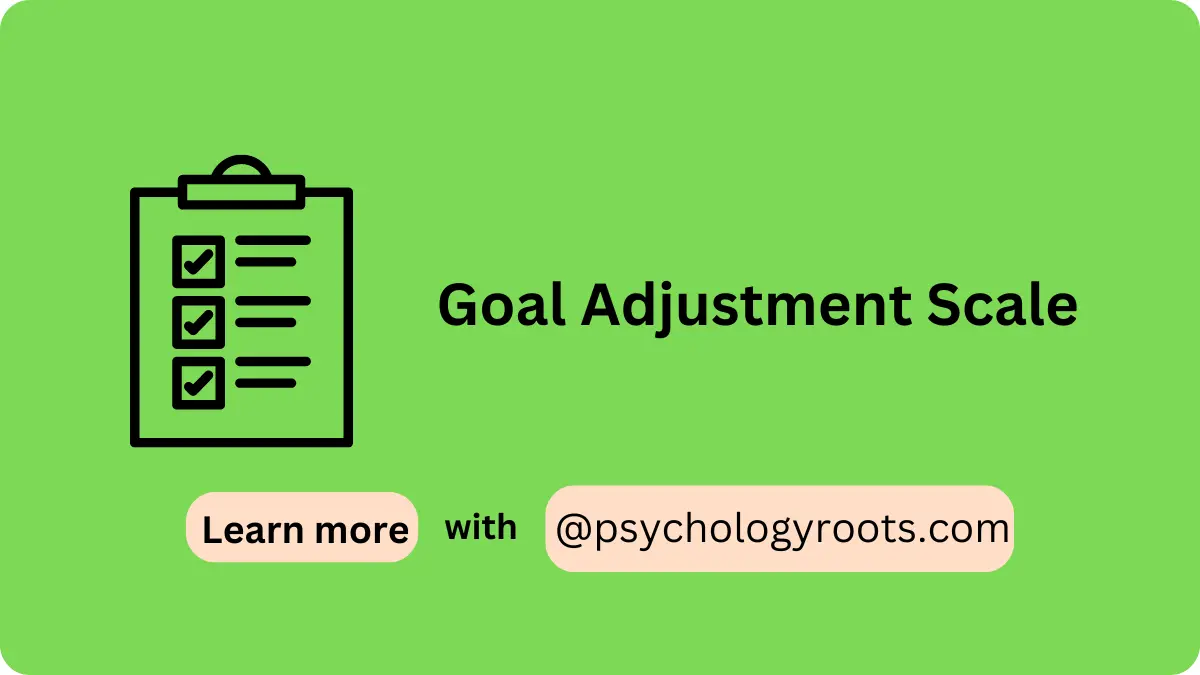Table of Contents
Goal Adjustment Scale
Here in this post, we are sharing the “Goal Adjustment Scale”. You can read psychometric and Author information. We have thousands of Scales and questionnaires in our collection (See Scales and Questionnaires). You can demand us any scale and questionnaires related to psychology through our community, and we will provide you with a short time. Keep visiting Psychology Roots.
About Goal Adjustment Scale
Scale Name
Goal Adjustment Scale
Author Details
Carsten Wrosch, Michael F Scheier, Gregory E Miller, Richard Schulz, Charles S Carver
Translation Availability
Not Sure

Background/Description
The Goal Adjustment Scale (GAS) was developed to measure individuals’ capacity to adjust to unattainable goals by either disengaging from the goal or reengaging with new, attainable goals. This adaptive self-regulation strategy is essential for maintaining psychological well-being, particularly when individuals face challenges or setbacks in their personal and professional lives.
The GAS is grounded in goal disengagement and reengagement theory, which suggests that the ability to flexibly adapt to changing circumstances is crucial for managing stress, reducing emotional distress, and maintaining overall well-being. Individuals who can effectively disengage from unattainable goals and reengage in new goals are more likely to experience positive outcomes, including higher life satisfaction and lower levels of depression and anxiety.
Administration, Scoring and Interpretation
- Purpose: This scale is used in both clinical and research settings to assess adaptive coping strategies, particularly in contexts such as health challenges, aging, and professional burnout.
- Format: The GAS consists of 10 items rated on a 5-point Likert scale from 1 (Strongly Disagree) to 5 (Strongly Agree).
- Subscales:
- Goal Disengagement: Assesses an individual’s ability to withdraw effort and commitment from an unattainable goal.
- Goal Reengagement: Measures an individual’s capacity to identify and commit to new goals after disengaging from unattainable ones.
- Scoring: The GAS yields two scores—one for goal disengagement and one for goal reengagement—by averaging the item responses for each subscale. Higher scores indicate a greater ability to adapt by disengaging from or reengaging with goals.
Reliability and Validity
The GAS has demonstrated strong psychometric properties, with Wrosch et al. (2003) reporting high internal consistency for both subscales. The Cronbach’s alpha for the goal disengagement subscale is 0.84, and for the goal reengagement subscale, it is 0.86. The scale has been validated in a range of populations, providing evidence for its reliability and construct validity in measuring goal adjustment processes.
Available Versions
10-Items
Reference
Wrosch, C., Scheier, M. F., Miller, G. E., Schulz, R., & Carver, C. S. (2003). Adaptive self-regulation of unattainable goals: goal disengagement, goal reengagement, and subjective well-being. Personality & social psychology bulletin, 29(12), 1494–1508. https://doi.org/10.1177/0146167203256921
Important Link
Scale File:
Frequently Asked Questions
What is the Goal Adjustment Scale (GAS)?
The GAS is a psychological tool that measures individuals’ ability to disengage from unattainable goals and reengage with new goals.
Who uses the GAS?
The GAS is used by psychologists and researchers to assess goal regulation and its impact on emotional well-being.
How are goal disengagement and reengagement measured?
The GAS uses two subscales to measure goal disengagement (withdrawal from unattainable goals) and goal reengagement (commitment to new goals).
What is the purpose of the GAS?
The GAS helps identify adaptive coping strategies that promote well-being when individuals face challenges or setbacks in achieving their goals.
Is the GAS reliable?
Yes, the GAS has demonstrated high reliability, with Cronbach’s alphas of 0.84 for goal disengagement and 0.86 for goal reengagement.
Disclaimer
Please note that Psychology Roots does not have the right to grant permission for the use of any psychological scales or assessments listed on its website. To use any scale or assessment, you must obtain permission directly from the author or translator of the tool. Psychology Roots provides information about various tools and their administration procedures, but it is your responsibility to obtain proper permissions before using any scale or assessment. If you need further information about an author’s contact details, please submit a query to the Psychology Roots team.
Help Us Improve This Article
Have you discovered an inaccuracy? We put out great effort to give accurate and scientifically trustworthy information to our readers. Please notify us if you discover any typographical or grammatical errors.
Make a comment. We acknowledge and appreciate your efforts.
Share With Us
If you have any scale or any material related to psychology kindly share it with us at psychologyroots@gmail.com. We help others on behalf of you.
1 comment
I need of ranges of goal adjustment scale
kindly provide me ranges of GAS ,i need it urgently for my research purpose .I shall be highly thankful for your act of kindness.